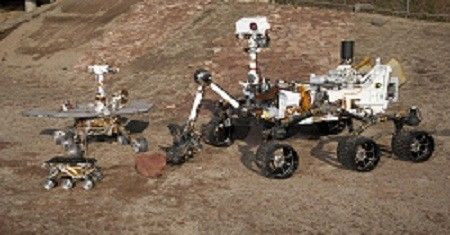American Space Agency NASA And Automobile Major Nissan Join Hands To Develop Self Driving Cars In Mars

Self-driving cars in Mars will soon be a reality as American space agency NASA and automobile major Nissan have joined hands to develop self-driving car technology capable of navigating on Earth as well as Mars. The research and development partnership of the two giants will stay for 5 years, in which engineers from both groups will work together to create the new technology usable in both cars and space rovers.
Maarten Sierhuis, Director of Nissan's Silicon Valley research center, said, "We find a perfect blend of capability of what robotics folks at NASA Ames have and the autonomy we can bring. The timing is also right because we are ready to start testing", reported NY Daily News.
Vehicle Test
It is hoped that the partnership will test the first vehicle of the fleet by the end of 2015 at NASA's Ames Research Center in Silicon Valley. Nissan has already made knwon its commitment to introduce autonomous navigation into the consumer market by 2020 with a $1,000 upgrade fee for its basic models. In the partnership programme, the Nissan Leaf will be used to test out self-driving car technology. The auto major is confident that the help of NASA will give it a strategic boost in developing a car that can navigate in nearly all situations.
Self-driving car technology was a popular theme at the recently held Consumer Electronics Show in Las Vegas. Held on Jan. 4, the show had major auto companies like Mercedes-Benz introducing concepts of self-driving cars. Under the pact, both Nissan and NASA will join the self-driving vehicle race in which Google, Mercedes-Benz and BMW are active contenders.
The concept of driverless cars has been made pretty exciting thanks to the interest evinced by companies like Google despite challenges in navigating urban environments. In the partnership programme, the space agency and automaker will be leveraging to develop a modified version of the electric Nissan Leaf capable of traversing the Red Planet without the requirement of a driver.
Mutual Gain
According to a Newsy report, Nissan is already testing a system that is smart and fast to navigate an unpredictable, urban environment. With NASA's help, Nissan hopes that it can adapt to the rocky, desert-like terrain in Mars. The advantage for NASA will be that it can piggyback on Nissan's existing work on self-driving cars.
A leading NASA researcher, quoted by Wired News, said, "the more we look at it, the more there are similarities; NASA has a rover on Mars. It is not very autonomous. As we go deeper into space, into more and more dangerous locations, we need autonomous vehicles." After the end of partnership with NASA, Nissan hopes to launch self-driving cars for the consumer market.
(The writer can be reached with feedback at kalyanaussie@gmail.com)





















